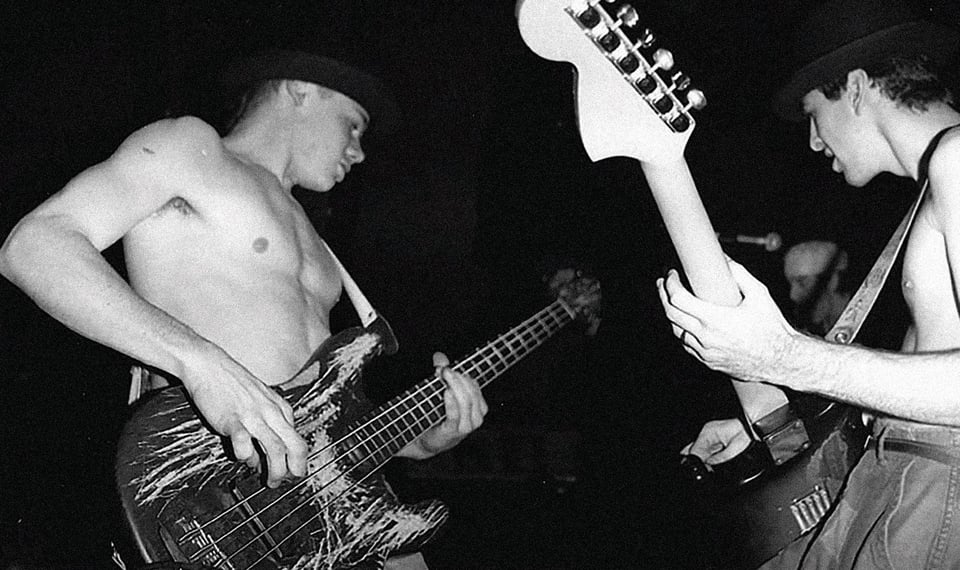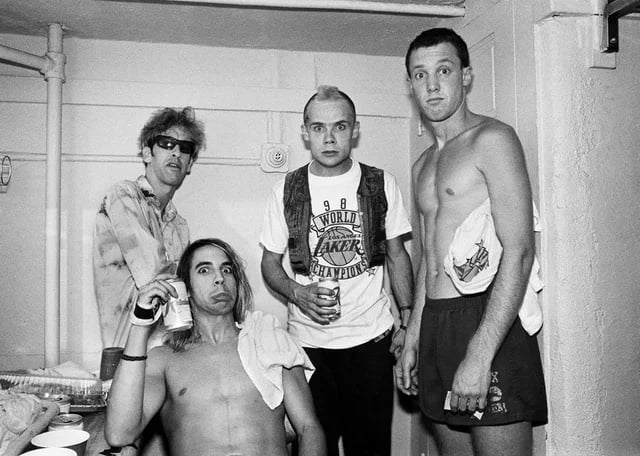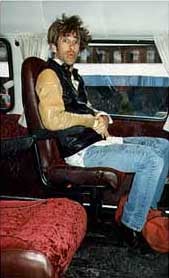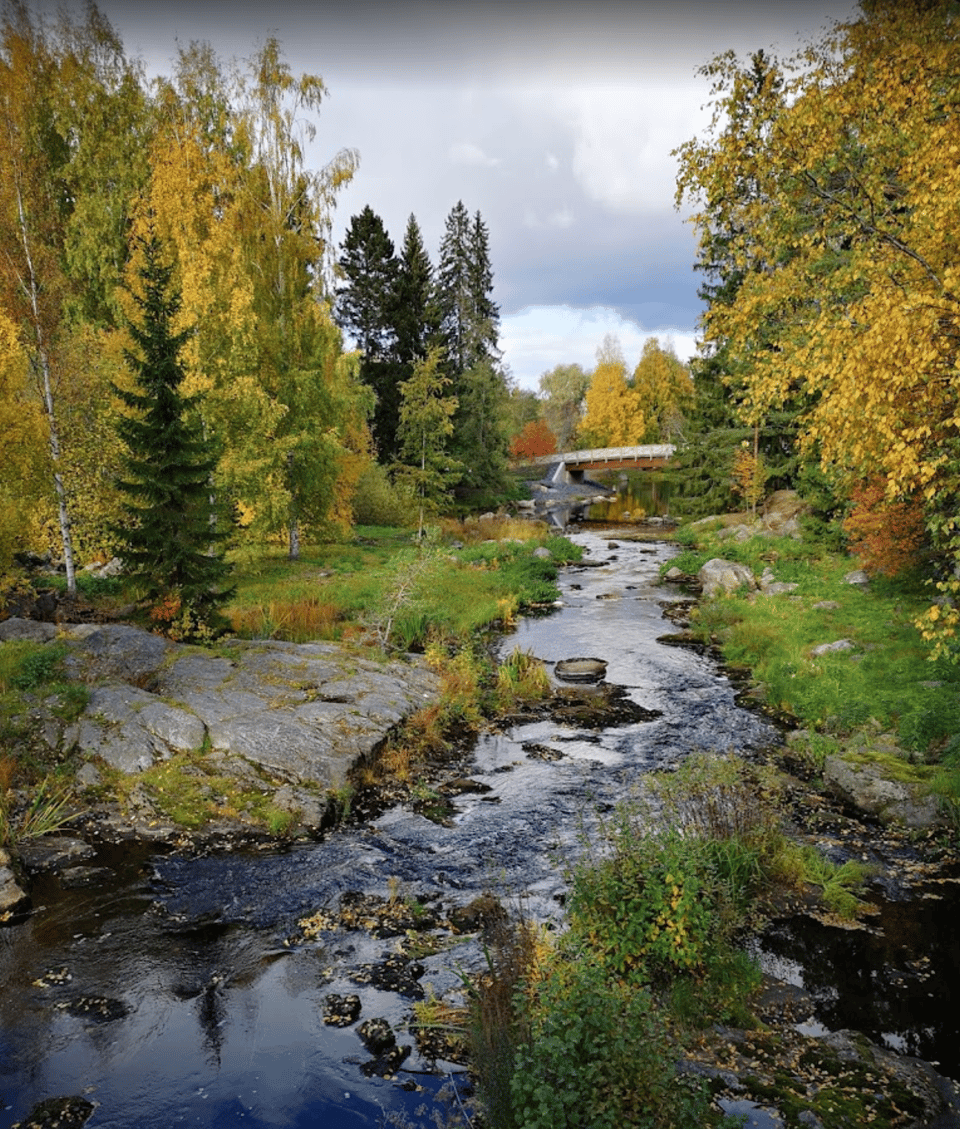Me and My Friends #55 - 26 Eternities of Hillel Slovak
It's April 13, which means it's Hillel Slovak's birthday. He would have been 61; the eldest of the original lineup. On the day of his 21st birthday, the still-brand-new band played the Anti-Club in Los Angeles:

One forgets how just young Hillel was when he passed. As I have approached and hurtled past the age of 26 myself, that's become even clearer. 26 is nothing. 26 is still a baby. Every other guitarist who has come since, bar John's first go round of course, was older than Hillel ever was. At this point everyone else in the band is comparatively ancient. During the I'm with You era, Flea and Anthony reached the moment in time in which they were double his age; John did so last year. But in those 26 short years he sure made an impact.
Hillel and Jack Irons started to play music together on the exact same day in the exact same building, taking lessons from the same music school. They met each other first, before either of them had met Flea or Anthony. From that point on, except for a brief 16 month period when Jack stayed behind in What is This, they were in a band together every day for the rest of Hillel's life. When What is This and the Chili Peppers signed their simultaneous record deals, it was Hillel and Jack who had to go off together. It was Hillel who brought Jack back to the Chili Peppers, because he didn't want to play without him any longer. It was Jack who left when Hillel had died. They were better together; maybe Jack couldn't bare being without him again.
“I wish Hillel hadn’t missed out on that first recording in the first year,” he added. “We did some TV shows in 1984 and I look at them now and think: Damn, I wish Hillel would have been there for that. He was a creator of the band. That was his baby."
The band was his baby, but he created an archetype in leaving it. Hillel didn't just help start the band, he helped it keep going by leaving it. A sort of strength-through-stress. As I've gone on about at length elsewhere, losing Hillel (and Jack) in 1983 was the best thing that could have happened at that moment in time.
Something to marinate on that doesn't get much consideration; Hillel's real feelings about Jack Sherman replacing him in the band, and his reaction to Jack's subsequent (and sensational) guitar work. How did Hillel feel when he heard the debut album and witnessed the band live? We've seen virtually every guitarist the band have had since respond, in some way, to the work that has come after them, either publicly or privately. Hillel was instrumental in getting Jack Sherman into the band, and he still remained close with them for the fifteen or so months he was out of it (hell, he [and Jack I] even played with the band while Jack S [and Cliff M] was still in it). But when he heard The Red Hot Chili Peppers, what did he really think? Was he proud of his friends, or did he simply wish he was still there with them? Did he think Jack was too straight and smooth-edged? Was he jealous of his chops? Did he feel that he, in fact, was the right man for the job, and get the sense that everyone else in the band felt the same way, and took a kind of self-satisfaction in that, even if in the short term there was nothing he could do about it?
But we all know what happened in the end. Hillel had no problem picking up where Jack left off, and used/expanded upon his work quite happily. Of all the songs on Freaky Styley, he only wrote "Nevermind," "The Brothers Cup," and "Sex Rap." A few weeks after Jack Sherman was fired, Hillel called him up and had to ask him how to play "True Men Don't Kill Coyotes." No egos here.
There's a great version of "Mommy, Where's Daddy?" from November 29, 1986, in a packed club in Indianapolis, Indiana. The band's endless insistence in toting this song out in the middle of their set never fails to delight me. When it's finished, Hillel wryly asks the crowd: "Not bad for four guys with undescended testicles, huh?"
Speaking of the self-titled era, ever notice how the verse riff in "Baby Appeal" is almost identical to the verse riff in "Funky Crime" which is, in turn, almost identical to John's riff in the intro jam on Live in Hyde Park? They're all based around the "Hendrix" chord. It is the river running underneath the Chili Peppers. It all began with "Out in L.A." and made itself permanent and basically irreplaceable from there, and it was put there by Hillel. He would have cribbed it from Hendrix, directly from the source. It can be used whenever, wherever. If I were, say, the former guitarist for Jane's Addiction, who didn't have a great passion for funk music and had to fake it occasionally in the band that I had recently joined, I'd fall back on it a lot too.
From one extreme of the band to the other. What does Josh Klinghoffer feel when he thinks about Hillel? He and Chad are the only (long-serving) members of the band never to meet him (and if we count short-lived members, you can maybe only add Jesse Tobias to that list). For Chad it makes sense; he had only just arrived in Los Angeles when he joined the band, six months after Hillel's death. But he was around at the same time, the right age. In Josh's case too, he was only eight years old when Hillel died, after all. But as someone who took his place in the band, had such a close relationship with the two people who knew him best, and had a further close relationship with his direct spiritual and literal successor... If the band is a family, which it is, the memory of Hillel within that family must have been like seeing a photo of a relative you never met. And Hillel left behind so much for him.
There have been bits and pieces of Hillel that Josh channelled throughout the years. I remember an interview Josh did, maybe around the time of The Getaway's release, when he recalled whilst laying down his guitar part on "We Turn Red," turning to rest of the band and saying it reminded him of something Hillel would have played (I will keep my feelings about that particular song to myself). There was another moment, on stage, when Josh channelled Hillel in a much more physical way.
Three examples of Hillel's stellar guitar work, just three random ones out of thousands (this whole letter could be a list like this): the solo in "Fight Like a Brave," which seems like three different guitar players fighting for space; the way he plucks the back of his nuts (ahem) at each jagged break in the demo version of "Police Helicopter," using the guitar as a percussion instrument; the chorus-laden funk of What is This's "Mind My Have Still I" - it's easy to see that this guy would be recording Freaky Styley under a year later.
I'm a defender of "Party on Your Pussy." It's a ridiculous song, a little embarrassing, and dated as anything from the band's catalogue, but it still makes me happy when I hear it. Lyrics aside, Anthony's vocals on it are actually quite impressive (that scream at the end is great), and Hillel's guitar work is his usual sensational. But I can't help but smile, if only because of an invented scenario; Flea, Hillel and Jack have spent the last few weeks working on a piece of music, a funky but syncopated thing with a complex riff that turns around on itself inside a four bar period. It's rhythmically challenging but something you can also nod your head to. And then Anthony comes in with those lyrics...
The band were okay with them, at least outwardly, but I can't help but wonder if they'd have been happier if the song were about, well, literally anything else.Hillel is an enigma of sorts, at least to someone who never got the chance to know him and from a distance of thirty-five years. There's plenty of photos, recordings, memories. But there is very little out there direct from him, especially if we compare it with the torrents of information Flea and Anthony have given us in the many more years they've had on the earth. We've all seen the Miami Beach interview, I hope. The Chili Source, probably the most complete collection of interviews by the band out there in one place, only has a handful of quotes from him. In the course of writing my book, I fell back on memories from mainly Flea and Anthony - I can only salivate at the prospect of having Hillel's perspective in there too.
The little we do have portrays a deeply clever man, with a dry sense of humour that occasionally veered into less pleasant territory. He liked gross-out humour (he was only 26, remember) but he was undeniably great with words. I get the feeling he was a fan of "Party on your Pussy"'s lyrics. Once I found an interview once that he gave to the Hartford Courant newspaper ahead of a show in Connecticut. As he described the band, he uttered the phrase, "we don't just play, we display." Six years later, Anthony used the same line in "Sikamikanico." It had to have been a tribute.
I came across this other tribute a few weeks ago. The full interview from Anthony is quite nice. We forget that even as they found John and Chad and all that success, they had still only months previously buried their friend, and the grief would have emerged all the time.
“We’re all pro-LSD!” adds Hillel, “but drugs are a touchy subject. We’ve experimented and found some drugs a weeny bit death-orientated.”
One source of primary text from Hillel is the book his brother James put out in 1999, Behind the Sun, which collects a few of his diary entries along with some of his paintings. Good luck finding a copy at a non-exorbitant price.
I'm not 100% sure how I feel about it being released in the first place: aside from the atrocious graphic design (songs he had nothing to do with, like "True Men Don't Kill Coyotes" are splashed graffiti-style across photos), incorrect transcriptions of said-entries, and shoddy binding quality (it falls apart literally immediately upon opening; you turn a page, you lose a page), a diary is a private thing and there's an element of icky voyeurism in seeing Hillel's internal thoughts out there for all to see. In one entry he describes visiting former band mate Alain Johannes, and totally denigrates his new music; in another, he details how a sexual partner tastes, even if she does have an infection. Hard to imagine Hillel being happy with those (probably flippant) thoughts being out there. Then again, I bought a copy. I never said I wasn't a hypocrite.The predominant thought I have while looking at Behind the Sun, is that Hillel's battle with and eventual demise to drugs/heroin is the unspoken theme of the book. James Slovak's introduction centres around the news of his death being broken to him. In every second entry, or just about, Hillel is talking about drugs, has just taken drugs, is worrying about his drug-use. The painting he was found dead on, keeled over, cigarette burning a hole through it, is prominently displayed on its last page as a kind of blunt goodbye. It's as if his life is being swept towards one singular moment. He just wants to play music, but there's something in the way.
The Chili Peppers are always going to have that unfortunate connection to drugs, the "distraction," if it were. They are so much more than a narcotic, but it flavours every aspect of their story. What should be a celebration gets sidelined; what should have been a long life is cut short. Sure, the early partying, the loss of Hillel, almost losing John...it sold papers and magazines. But even when they don't go near the stuff it sticks around. Since about 1999, as the band entered the more mature phase of their career, the new line is: what's it like to keep going sober? Can you stay sober? Do you remember that time you were a drug addict? Anthony and John, the survivors, went from being the heroin-addled guys to the sober guys. It's a binary thing; A or B; black or white. Hillel wasn't a survivor, so his afterlife gets clouded by the same thing his life was. No mention of him, this letter included, fails to mention how he passed away.
Hillel spent most of 1988 in bad shape. You can sort of see the change happen around the time of Uplift Mofo's release; his face changes, his hair gets longer, he gets the bags under his eyes. It's a bad picture anyway, but this guy doesn't look 25 years old to me; it's clear he's in trouble:
 And it's glaringly obvious when watching Bram Van Splunteren's documentary about the band, filmed in February 1988, that Hillel is struggling; the listlessness and lethargy. In one section he's passed out on a bed while the rest of the band are giving an interview. But touring life is hard in the best of circumstances. There's that distraction again; the documentary should be a fascinating look at a specific period of the band. Lightning in a bottle, up close and personal and behind the scenes. What luck that the crew was there to record it. Instead, it becomes a sort of morbid preview of tragedy to come.
And it's glaringly obvious when watching Bram Van Splunteren's documentary about the band, filmed in February 1988, that Hillel is struggling; the listlessness and lethargy. In one section he's passed out on a bed while the rest of the band are giving an interview. But touring life is hard in the best of circumstances. There's that distraction again; the documentary should be a fascinating look at a specific period of the band. Lightning in a bottle, up close and personal and behind the scenes. What luck that the crew was there to record it. Instead, it becomes a sort of morbid preview of tragedy to come.Here are Hillel's last ten performances as a member of the band and as a human being, and the status of the venues those performances took place at. Can you still exist inside these rooms? I hope you'll indulge me a bit of long-distance tourism. (There's something else here; a kind of nostalgia for something you didn't actually experience. When a building goes down, obviously so does a certain kind of connection you can have to the memories made there. It's not the same to stand on a bit of pavement and try to imagine a building.)
May 23, 1988
Draf-en Renbaan, Landgraaf, Netherlands
This was the Pinkpop festival, and took place outdoors, at a horse-racing track that essentially still exists. Though of course an outdoor concert is never suitable for lists like these, because without the margins of a building it's hard to really say you were actually in the "same place." It's as if without a roof all the memories seep out. You know what I mean.May 24, 1988
Club Ubu, Rennes, France
Still standing, and from the looks of it still very much in the same spirit that it was when the band played it in 1988.May 25, 1988
Le Zenith, Paris, France
For this show, the band was supporting Australia's Midnight Oil, which is a connection I didn't know ever happened. Le Zenith is still open.May 27, 1988
Zeche, Bochum, Germany
Still going strong. Seems mainly filled up with tribute acts these days (is that where the money is? I can imagine so, especially in smaller towns).May 28, 1988
Odeon, Munster, Germany
Gutted in 2002, but the building still stands.May 29, 1988
PC69, Bielefeld, Germany
Torn down circa 2005. Love this website; one day I'll put the same amount of work into RHCP-related venues.May 31, 1988
Traumfabrik, Kiel, Germany
A combined theatre, dance-hall, restaurant, bar. This place looks incredible. And it's still open.June 1, 1988
Musikcafe'n, Copenhagen, Denmark
The Musickcafe seems to have closed (but let's face it - my Danish is rusty) although the building itself isn't going anywhere.June 2, 1988
Sardine's, Oslo, Norway
Sardine's was the name given to the club in the basement of a much larger Concert Hall in Oslo. It closed in 1989 but there's a similar venue in the spot now.June 4, 1988
Törnävänsaari, Seinajoki, Finland
Hillel's last performance was at the outdoor Provinssirock Festival in June 1988. Where the Pinkpop show was held at a racetrack, this one was at the much nicer Törnävänsaari - essentially an island in the middle of the city of Seinajoki, which the festival takes over once a year.
This photo was taken after the show and is probably the last one ever taken of him:
There are so few places in the world to go to pay tribute to Hillel. His grave in Los Angeles, of course. A variety of apartment buildings that he once lived in. His final US show was at the Palace, which is still open.
If you're ever in Finland, maybe it would be nice to go to the island where he last rocked out, and rock out a little bit with him. Maybe you could do a tour of his last tour, with Freaky Styley and the Uplift Mofo Party Plan and Squeezed and Wattsland in your earbuds, appreciating all he left while he was here.
 But even when he was suffering, the real him shone through on occasion. It was a fire that didn't want to go out. This aspect of him is the one that should be remembered; the funny guy, the slight lisp as he deadpans to a camera. He'd be gone so soon after this. It's clear he had so much more left to give: so many more amazing riffs, performances, jokes, diary entries, paintings - I didn't even mention the paintings! He was a true rocker. The demo version of "Green Heaven." I mean, come on. That's all I need to say.
But even when he was suffering, the real him shone through on occasion. It was a fire that didn't want to go out. This aspect of him is the one that should be remembered; the funny guy, the slight lisp as he deadpans to a camera. He'd be gone so soon after this. It's clear he had so much more left to give: so many more amazing riffs, performances, jokes, diary entries, paintings - I didn't even mention the paintings! He was a true rocker. The demo version of "Green Heaven." I mean, come on. That's all I need to say.Happy birthday Hillel. Your work lives on.